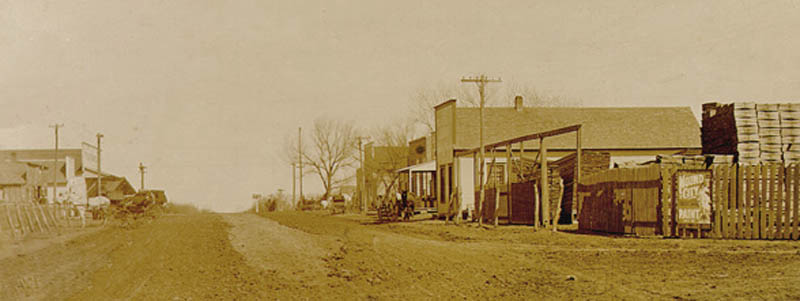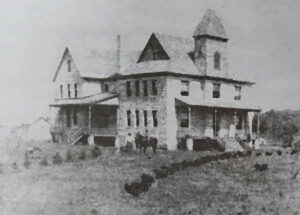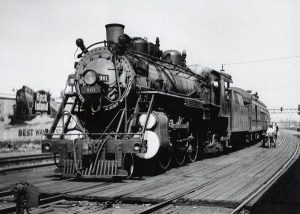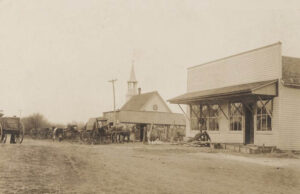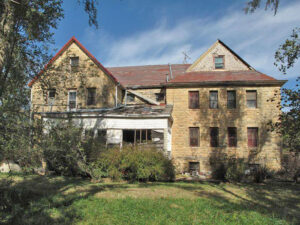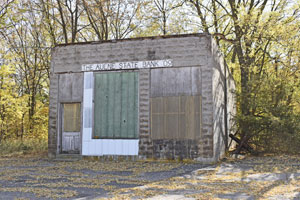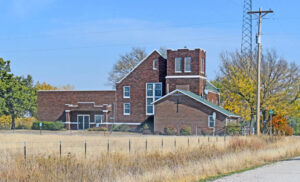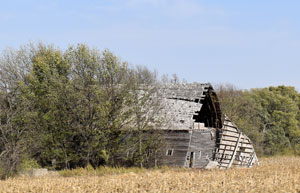Aulne, Kansas, is an unincorporated community and technically an extinct town in Marion County.
It started in 1887 when the Chicago, Kansas, and Nebraska Railroad built a branch line north-south from Herington through Aulne to Caldwell. Railroad officials suggested its name. A post office was established on August 19, 1887.
That year, Marion County purchased 160 acres of land from settler William Glover to build a poor farm. Between 1889 and 1890, a large two-story stone building was erected to house the county’s indigent. It was located one mile west and about two miles north of Aulne. The large three-story stone structure was called the Marion County Poor Asylum. Indigent and “incompetent” people could live there with adult supervision, work the land, raise their own food, and earn their keep. Unwed pregnant girls could also stay there until they delivered their babies, which were put up for adoption through the County Health Department.
The farm’s first operator was V.P. Duvall, who came to Marion from Lincolnville where he managed the Grand View Hotel. It was a full-time job to farm the land, raise the hogs and cattle, do their own slaughtering, and grow the gardens to feed the inmates. The asylum was self-sustaining for several years, even paying taxes to the county. Operators that followed Duvall were Mr. and Mrs. Adam Beltz and W.K. Palmer.
In 1891, the railroad was foreclosed on and was taken over by Chicago, Rock Island & Pacific Railroad.
W.K. Palmer led the poor farm during its most prosperous years. A 1900 Marion Record article cites the farm as self-supporting:
“The proceeds of the Marion County Poor Farm more than pay the institution’s expenses for the present year. There are ten inmates. About $250 worth of butter and eggs are sold off the farm each year, besides a large amount of livestock. State Labor Commissioner Johnson, in his report, says: ‘Taken as a whole, inmates of the Marion County Poor Farm enjoy a better home there than they ever knew, with no expense to the taxpayer, as the farm will pay nearly $200 per year above expenses.”
A similar article in a 1901 Peabody, Kansas, paper notes that Superintendent Palmer housed 12 inmates evenly divided among men and women. Job duties of inmates were defined as “women do the cooking, sewing, mending and housework and the men help on the garden and field as they are able.” Palmer’s management was defined as “shrewd” and careful planning to accomplish much on the poor farm with inmates governed by strict rules laid down by the county.
In the early 20th century, Aulne was one of the finalist communities considered for Tabor College before it was established in Hillsboro in 1908.
In 1910, Aulne had a money order post office and continued to be a station on the Chicago, Rock Island, and Pacific Railway. At that time, it had a good local trade, did considerable shipping, and reported a population of 150.
During World War I, the local telephone company decreed that “No German could be spoken over the telephones” because of anti-German sentiment towards German Americans.
During World War II, the Poor Farm utilized Germans from the German Prison camp in Peabody to help during harvest, threshing, and hauling in hay or grain. The prisoners also helped with other tasks, such as canning to prepare for the winter months and ground maintenance.
During the management of Mr. and Mrs. Godfrey Beisel, the State Department of Kansas notified the county that major renovations and repairs would need to be done. Patients were moved out, and the home was closed for about two years. In 1950, the commissioners of the county welfare department moved toward re-opening the home. At that time, 120 acres of land were sold to pay for renovation and remodeling. A total of $34,000 was spent to enlarge the building, add new equipment, and install an elevator. Work included converting the entire basement into a recreation room where residents of the home could visit together or entertain friends and visitors. The building had two modern bathrooms on each upper floor and a half bath in the basement. A new addition to the home was a glassed-in sun porch on the south of the building. There was room for 30 residents in the home when it was completely furnished.
Mr. and Mrs. Arthur Loewen, from Herington, were then appointed managers. At this time, the name was changed to Cedar Rest because of the attractive cedars on the place and also to remove the stigma of “poor asylum.”
The Aulne post office closed on February 28, 1954.
Cedar Rest was used until the 50-bed Marion County Home was built at Peabody. The patients were moved there in 1964, and the old landmark was sold at auction in November 1964.
Art and Virginia Mills bought the old stone building and remodeled it into a lodge and restaurant. The”Cedar Villa” was opened in the fall of 1968.
Today, the 2.72 acres remaining of the original poor farm are listed on the Register of Historic Kansas Places. The large 3-story limestone building is now privately owned. Occasional tours are given by appointment. It is 3.2 miles northwest of Aulne at 1625 Old Mill Road. The building is behind a grove of trees and is posted “no trespassing.” The poor farm’s cemetery is located a few hundred feet north of the poor farm.
The community of Aulne is now a ghost town.
Brush and trees cover an area where businesses once stood. Many buildings were moved or torn down, but several houses still stand, as well as the old Aulne State Bank. However, the Methodist Church still stands and continues to serve parishioners today.
Aulne is located southwest of Marion at the intersection of Pawnee Road and 140th Street, next to the Union Pacific Railroad.
©Kathy Alexander/Legends of Kansas, February 2023.
Also See:
Santa Fe Trail in Marion County
Sources:
Blackmar, Frank W.; Kansas: A Cyclopedia of State History, Vol I; Standard Publishing Company, Chicago, IL 1912.
Genealogy Trails
Kansas Ghost Towns
National Register Nomination
Wikipedia

